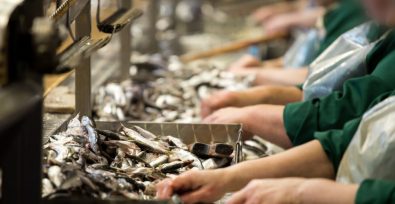Massachusetts lawmakers are considering new legislation filed in response to an investigation of child laborers in New Bedford, the nation’s highest-grossing fishing port. The investigation found that behind warehouse doors, migrant teenagers were doing hazardous work. Some teens as young as 14 operated machines that kill crabs and strip skin and bones off fish. Many worked overnight and went to high school on just an hour or two of sleep.
New bill aims to ban teens in seafood processing
Massachusetts State Rep. Christopher Hendricks filed a bill to ban anyone under 18 from working in seafood processing and packing facilities. The bill also proposes raising the minimum fine for child labor violations in Massachusetts from $500 to $20,000. Hendricks said the higher penalty would push employers to take the law seriously.
In a report by The Public’s Radio, Hendricks states,
“I filed this bill alongside Senator [Mark] Montigny and Representative [Antonio] Cabral in direct response to deeply troubling reports of child labor abuse.”
“A $500 fine for a multimillion-dollar corporation isn’t going to do anything. Now they have an incentive to do their own due diligence.”
But does the bill miss the mark?
While the bill aims to prevent teens from working in hazardous seafood processing facilities, it does not get to the route of the problem. Advocates argues that the bill does not address why teens are taking these jobs in the first place. Helena DaSilva Hughes, director of New Bedford’s Immigrants’ Assistance Center, shares her mixed feelings about the bill:
On the one hand, Hughes said seafood processing jobs are dangerous for teenagers. There have been fatal accidents in New Bedford’s fish houses where adults got their clothes and skin caught in machines that sucked them in and killed them.
But Hughes said not being able to work will hurt the kids too, as many of them still owe debts to the coyotes or smugglers who got them here.
“You’re putting your family in a very dangerous situation, to the point that the families could even be killed,” Hughes said, “and you hear this from the kids when you talk to them.”
Many teens interviewed for the investigation said they bought fake IDs to get hired. Without work permits, they took any jobs they could find, often in fish houses locals call pescadarias. Hughes said banning them from one industry may just push them into other unsafe work.
A national problem
Hendricks’ bill is now in committee at the Massachusetts State House. Legislators must decide by August 9 whether to send it to a full vote.
While Massachusetts tries to close loopholes, many children are still vulnerable to exploitation in across the country as child labor laws continue to loosen.
Join us calling on lawmakers to strengthen—not weaken—child labor protections to keep young people out of hazardous and exploitative work.







Freedom United is interested in hearing from our community and welcomes relevant, informed comments, advice, and insights that advance the conversation around our campaigns and advocacy. We value inclusivity and respect within our community. To be approved, your comments should be civil.
it is quite outrageous and very de humanising to to treat children in any way of exploitation.how do you sleep at night when you have caused such distress and rear to anyon, let alone Children.pure greed on your part. dispicable.